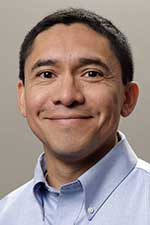When the Smoke Clears: Focusing Events, Agenda Setting, Issue Definition, and the Politics of Gun Control
by Drs. J. Salvador Peralta and Anthony Fleming
On December 14, 2012, Adam Lanza, a gunman with a history of mental illness, committed one of the worst mass murders in recent American memory. First he killed his mother at the home they shared. Then, armed with a semi-automatic firearm, Lanza walked into Sandy Hook Elementary School in Newtown, Connecticut, murdered twenty first-graders, six staff members, and then killed himself. Mass murders at schools and colleges, as well as the assassinations of such prominent American figures as Dr. Martin Luther King, Jr., and President John F. Kennedy, known as gun violence focusing events, have become an unfortunate part of the American experience.

Dr. J. Salvador Peralta is working with Drs. Anthony Fleming, Gregory Dixon, and Paul Rutledge on a multi-year gun violence project.
Although relatively rare, these events have an impact on American public opinion, and attach powerful symbols to the drive for policy change, particularly policy aiming to prevent such events from occurring ever again. Not surprisingly then, within minutes of the Sandy Hook Elementary shooting, news media were providing uninterrupted coverage of the event, the victims, the gunman; as well as bringing attention to gun policy issues.
The question that remains, however, is whether the increased public attention resulting from such unfortunate events translates to increased attention on the congressional agenda. In other words, do firearm related focusing events lead to an increase in the introduction of congressional bills proposing alternative solutions to gun violence?
To answer this very timely and important question, four members of the Political Science department are engaged in a multi-year project to better understand the relationship between gun violence focusing events and policy change. Drs. Anthony Fleming, Gregory Dixon, Paul Rutledge, and J. Salvador Peralta have already presented preliminary findings at the 2014 Annual Meeting of the Southern Political Science Association, and are presently revising a manuscript for submission to a peer-reviewed journal.
Their preliminary findings suggest that focusing events serve as catalysts for bill introduction by framing gun control policy along five particular frames: restrictive, restrictive-punitive, punitive, punitive-lenient, and lenient. In the aftermath of a focusing event, policy entrepreneurs use these frames to signal issue positions to other politicians, the media, interest groups, and the public, as well as to strategically counter opposing issue positions. These efforts are made in order to redefine the gun control debate at a time of heightened public attention, which could potentially lead to issue redefinition and eventually policy change.
Dr. J. Salvador Peralta is a professor and chair of the Political Science department. Dr. Anthony Fleming is a limited term associate professor in political science.
Do you have a comment or opinion about this story's topic? Perspective Online wants to hear from you. Submit a letter to the editor at perspect@westga.edu today.
